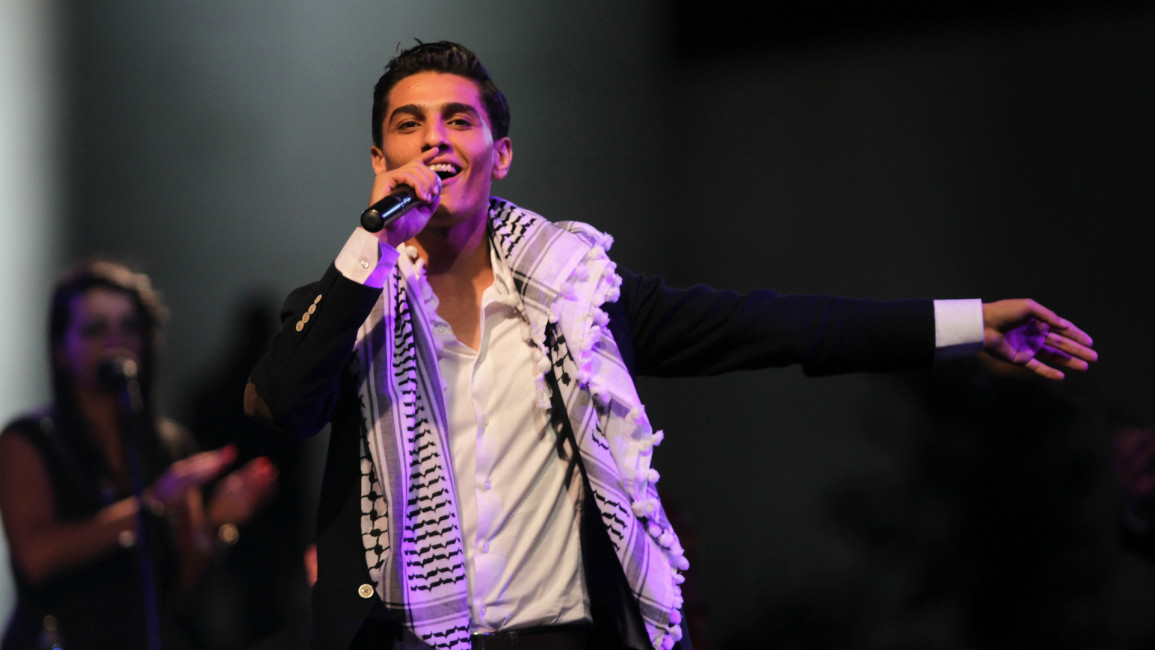
Doha Film Institute to co-finance Mohammad Assaf biopic
Doha Film Institute to co-finance Mohammad Assaf biopic
Blog: The Qatari cultural organisation is to re-tell Assaf's story, two years after he went from Gazan wedding singer to star after winning "Arab Idol".
3 min read
Mohammad Assaf has become an 'idol' for many Palestinians - young and old [AFP]
Doha Film Institute, based in Qatar, has announced its intention to co-finance a biopic about Mohammad Assad, a young singer from Gaza who became a worldwide sensation after winning the Arab Idol TV talent show in 2013.
The film will accordingly be named The Idol, and will be directed by Hany abu-Assad, of Omar and Paradise Now fame - both acclaimed movies which examined the Palestinian cause.
It is set to premiere at the Toronto International Film Festival.
"Hany Abu-Assad is one of the most significant filmmakers from the Arab world, and we are honoured to be partners on The Idol," said Fatma al-Remaihi, CEO of the Doha Film Institute in a press release.
"Mohammad Assaf's remarkable story, the many struggles he had to overcome, and his love and commitment to his family and community in Gaza had a powerful impact on us."
|
|
||
| Mohammad Assaf in the Arab Idol final [MBC] |
His journey was fraught with difficulties; he was delayed for two days at Rafah crossing before managing to climb over a wall into the Cairo audition's venue.
During the 2013 competition, broadcast throughout the Arab world and beyond, he quickly gained audience popularity as he performed a wide variety of numbers, from Palestinian nationalist anthems to the hits of the Backstreet Boys.
In the series finale - in which he sang Lift up your keffiyeh, he was awarded the title Arab Idol, and has capitalised on his stardom for the past couple of years.
The song became an anthem for the Palestinian cause, and even had a Palestinian delegation dancing in the UN.
Palestinian politicians practically fell over themselves to lend their support to the young singer - as many said he did what they failed to do: provide Palestinians with a semblance of hope and national unity.
Following jubilant celebrations in Gaza, the West Bank and across the Palestinian diaspora, during which he was described as "the best thing to happen to Palestine in 60 years" - demonstrating the catastrophic nature of the Israeli occupation.
Assaf has remained characteristically humble. He says he has not let his success get to his head, and he will "never forget where he is from".
"I have learned there is a lot of hope, and that a person should not allow the circumstances surrounding him to affect him no matter how difficult they are," Assaf told al-Araby last year.
During the 2013 competition, broadcast throughout the Arab world and beyond, he quickly gained audience popularity as he performed a wide variety of numbers, from Palestinian nationalist anthems to the hits of the Backstreet Boys.
In the series finale - in which he sang Lift up your keffiyeh, he was awarded the title Arab Idol, and has capitalised on his stardom for the past couple of years.
The song became an anthem for the Palestinian cause, and even had a Palestinian delegation dancing in the UN.
Palestinian politicians practically fell over themselves to lend their support to the young singer - as many said he did what they failed to do: provide Palestinians with a semblance of hope and national unity.
Following jubilant celebrations in Gaza, the West Bank and across the Palestinian diaspora, during which he was described as "the best thing to happen to Palestine in 60 years" - demonstrating the catastrophic nature of the Israeli occupation.
Assaf has remained characteristically humble. He says he has not let his success get to his head, and he will "never forget where he is from".
"I have learned there is a lot of hope, and that a person should not allow the circumstances surrounding him to affect him no matter how difficult they are," Assaf told al-Araby last year.
|
|
||
| Mohammad Assaf music video, set in refugee camp in Lebanon |
Some of his hits since the show include ya halali ya mali, a re-working of a traditional Palestinian song - the video for which was shot in a Palestinian refugee camp in Lebanon.
The video makes for a marked contrast with many other music videos broadcast on Arab music hits channels.
During the 2014 Gaza war, he released a track encouraging the Strip's beleagured population, singing "lift your head up high… it's your weapon, the origin of humanity is dignity".
Whatever direction the film takes, Mohammad Assaf's life and rise to stardom is certainly worthy of the silver screen.
The film comes as the Doha Film Institute says it is seeking to invest in projects that are culturally relevant and commercially viable, and strengthen Qatar's nascent film industry by facilitating opportunities for collaboration and development for Qatari filmmakers.
The institute has supported more than 220 films from Middle Eastern and North African filmmakers since 2010 through its grants program.




